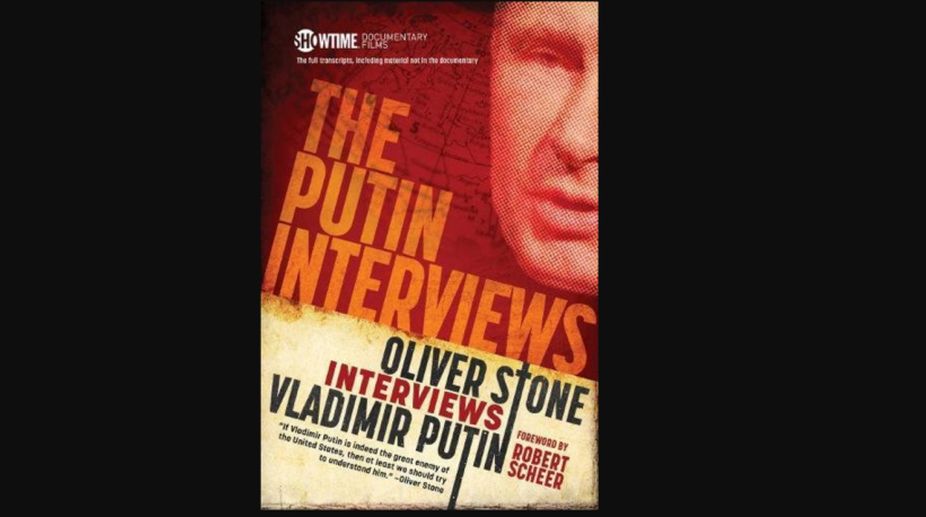Trump issues ‘last warning’ to Hamas as US confirms direct hostage talks
US President Donald Trump has issued what he called a "last warning" to Hamas to release the hostages being held in Gaza.

(Photo: IANS)
Title: The Putin Interviews
Author/Interviewer: Oliver Stone
Advertisement
Publisher: Hot Books/Skyhorse Publishing
Advertisement
Pages: 289
Price: Rs 699
What do we make of Vladimir Putin? There are those who deem him an astute statesman who has brought Russia back from the brink to a state of domestic stability, economic prosperity and international influence, while others are convinced he is a despotic and even totalitarian leader, who rocks the stable world order with land grabs, backing “unsavoury” regimes and influencing key elections.
Either perspective may arise from the news you are accustomed to hearing and believing. The latter view, though, is more likely to stem from the West, where the Russian President is viewed extremely critically since 2008 following the Georgian conflict, with his KGB background highlighted for “repression” at home, and Soviet era geopolitics for supporting Iran, bolstering the Assad regime in Syria, annexing Crimea, enabling Donald Trump’s victory and many other transgressions.
But the increasingly demonised Putin has his own views on how the US didn’t play fair after the Cold War ended, what its unilateral global interventions led to, what actually happened in Ukraine and the reasons why his country is accused of “fixing” the 2016 US presidential elections.
How can we decide between the two competing narratives? Why not allow the Russian President to present his own side of the story on these issues and other global happenings, and his view of his achievements and challenges?
That is what American filmmaker Oliver Stone, who never shies away from controversial subjects (Vietnam, JFK’s assassination) and contrarian views, has tried to do in his set of interviews with Putin in Moscow and elsewhere in Russia over nine days in four trips from July 2015 to February 2017. And here, you can read their transcripts along with an additional section about the veracity of his claims.
While the publishers note that since the Putin’s answers were translated, they “took the liberty of fixing grammar, unclear language, and various inconsistencies” and given the span of the interviews, editing out some repetitive matter in an effort to ensure that “the intent and meaning of what was said was accurately reflected”.
They have done a capable job, with Putin appearing far from the lethal, uncontrollable megalomaniac his detractors usually portray him to be, or spewing fire at adversaries — at times, he even politely rebukes Stone for trying to make him appear anti-American.
At the same time, he rues that the Americans have never reciprocated his country’s measures towards concord and cooperation, supported adversaries in the Caucasus as they supported “all the political forces including opposition forces”, sought to hem in his country with military and anti-missile installations geared to meet the “Iranian threat” and also interfered in the 20102 Russian elections by channelising money to opposition candidates.
Putin also gives a balanced view of recent Russian history, including the Stalin era — drawing parallels with Napoleon, on the shortcomings of communism and where and why Mikhail Gorbachev went wrong. He also asserts that Russia will not return to the old days of the Communist police state, clarifies his stand on the LGBT controversy and other seminal issues.
He is also candid about his family’s humble beginnings (his grandfather was a cook for Bolshevik bigwigs like Lenin and Stalin), his parents lost his elder sibling during the Siege of Leningrad during Second World War, and how he was wild as a teenager before his practice of judo — and service — made him calmer.
Putin also reveals that he doesn’t have disturbed nights or remember his dreams (unlike his interlocutor Stone).
He also displays a cultivated sense of humour — in response to Stone’s query during his second trip whether he missed the filmmaker, quips: “Yes, I cried every now and then..” and while presented a film DVD but opening the case to see its empty, says: “Typical American gift.”
Forthcoming as possible but also realistic, Putin, in the last meeting, tells Stone that he has given his version but doesn’t know “if anyone is going to be interested in that”.
Overall, he comes across as someone, who wields enormous power and influence but responsibly, guards and weighs his words, which are never shrill, rhetorical or bombastic, and can be effective without being flamboyant or loud. That are qualities that would be prized in any political leader, and Russia’s condition and influence are proof enough.
Advertisement